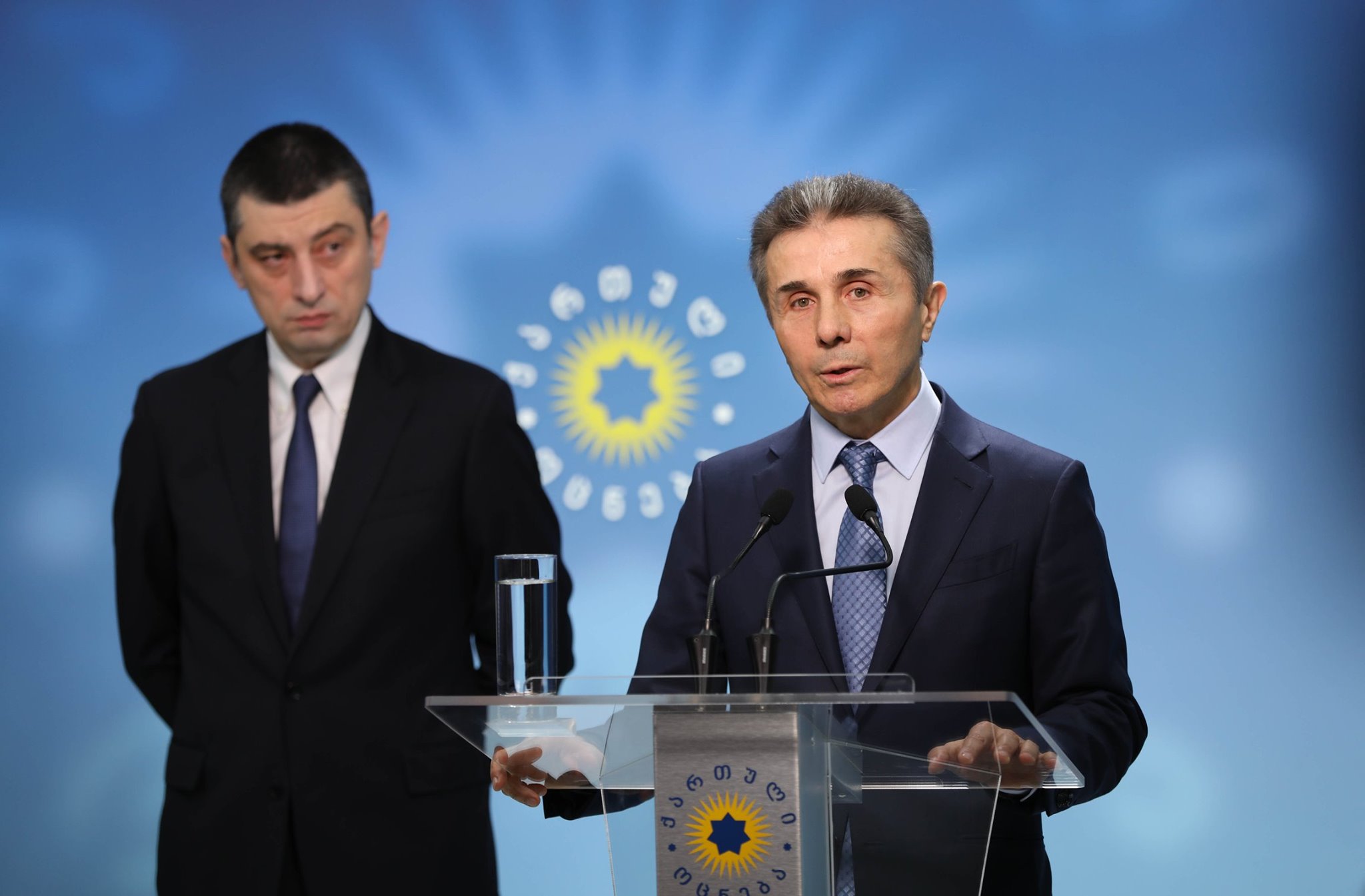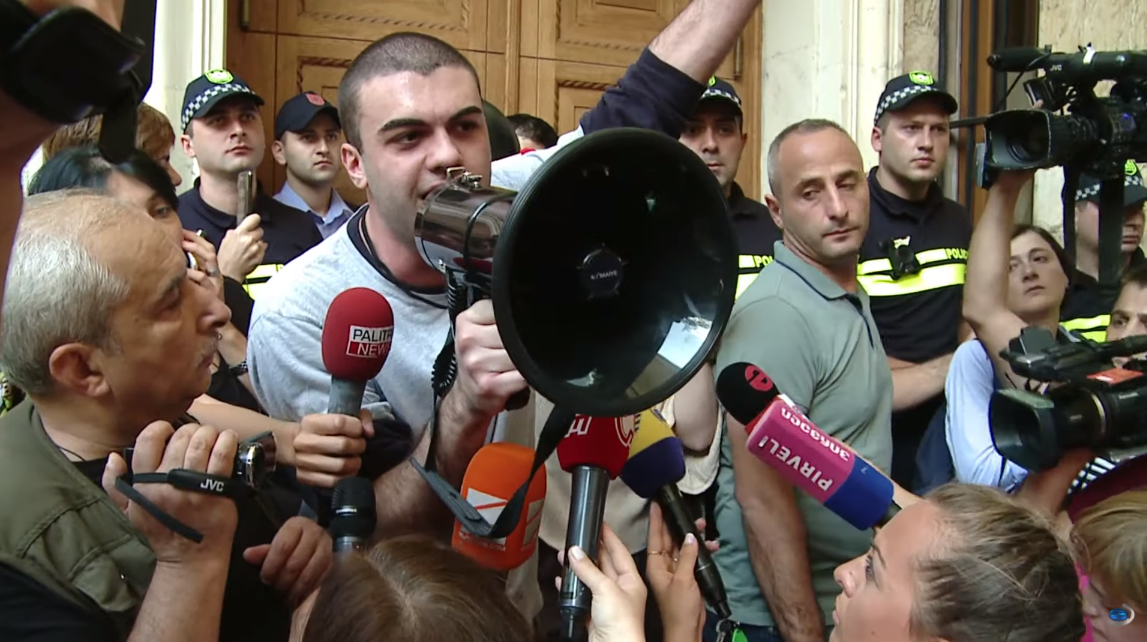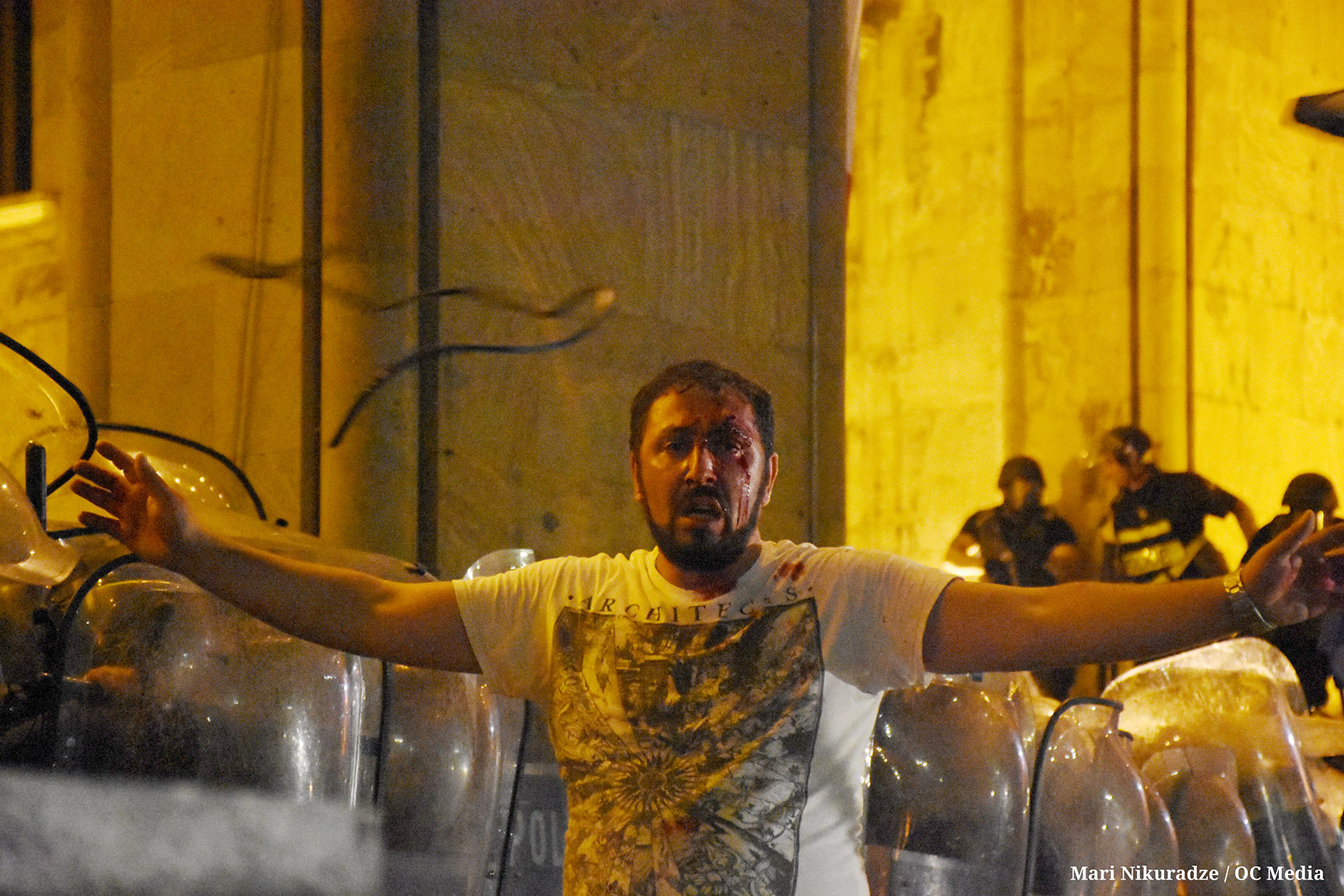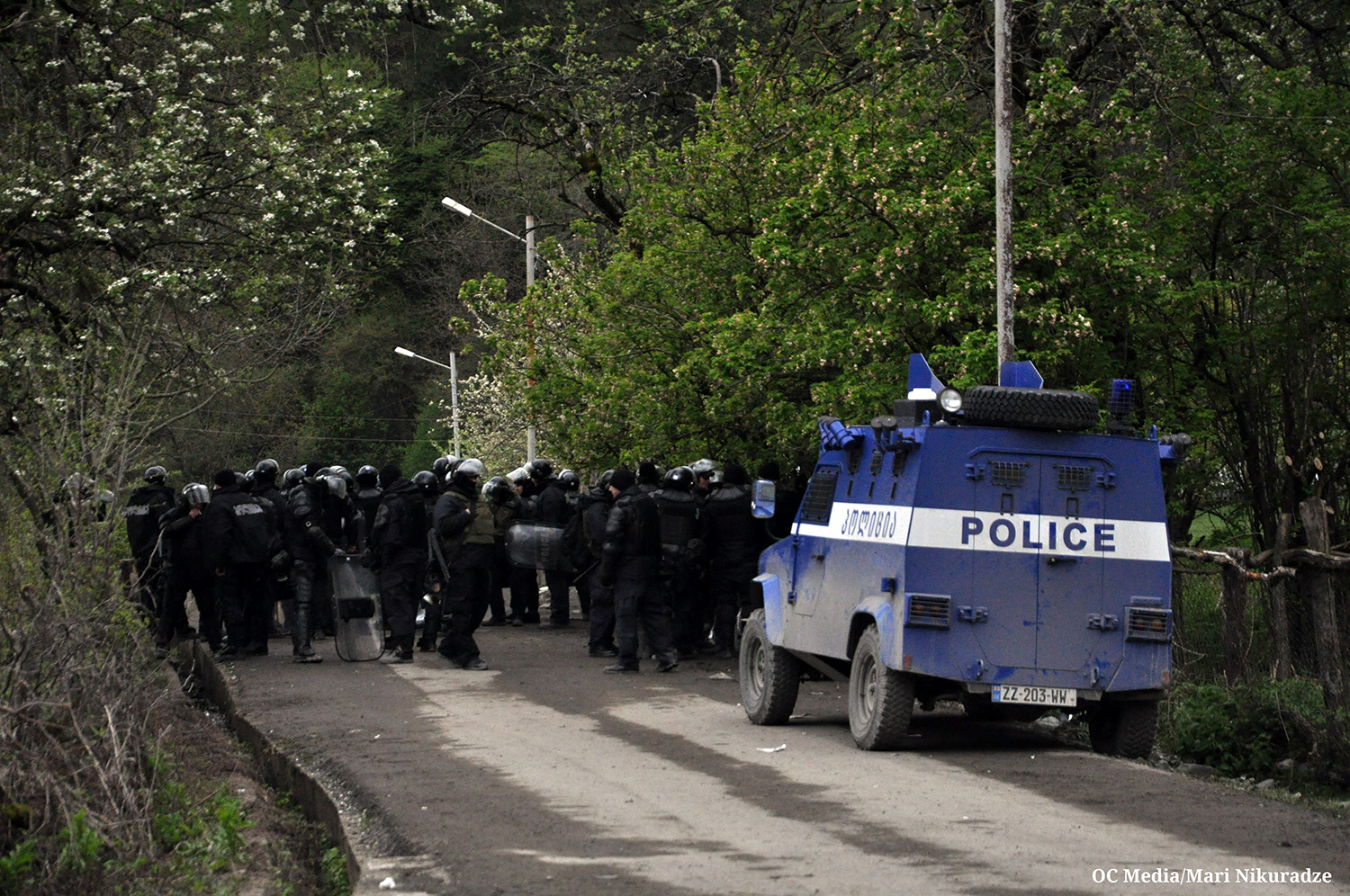
Controversial Georgian Interior Minister Giorgi Gakharia is slated to become the country’s next prime minister, the fifth under the rule of Georgian billionaire Bidzina Ivanishvili’s Georgian Dream party.
The ‘Shame!’ campaign by the For Freedom group, which has been demanding Gakharia’s resignation since June, called on people to protest his nomination for prime minister, which was unveiled earlier on Tuesday by Georgian Dream Chair Bidzina Ivanishvili.
‘It’s a slap into the face of society’, one of the leaders of the Shame! campaign, Shota Digmelashvili, told journalists outside parliament.
Earlier that day, protesters tried to enter parliament and organised a ‘corridor of shame’ for Georgian Dream MPs entering the building.

Some of them, including opposition MPs, managed to enter the plenary session opening, making noise with vuvuzelas and whistles as a sign of protest.
The campaign has targeted Gakharia for 76 days over the police use of force during 20 June street protests in Tbilisi.
[Rread OC Media’s report from the scene: 5 violations by police during the Tbilisi clash]
The ruling party quickly bowed to the street protests over a Russian MP addressing parliament from the speaker’s seat. Ivanishvili’s party removed Speaker Irakli Kobakhidze from his post and also promised to change the country’s electoral system to a fully proportional-party list. However, they refused to sack Gakharia.
On Tuesday, Georgian Dream doubled down on Gakharia as Ivanishvili named him the next PM.
The news came a day after Prime Minister Mamuka Bakhtadze announced his resignation through a Facebook post. The resignation set in motion a series of hearings at the parliament in order to confirm a new cabinet by 8 September.
According to Ivanishvili, it was his idea to nominate Gakharia as prime minister and his party ‘fully endorsed’ the candidacy.
Gakharia told journalists at a press conference that his new cabinet would include State Security Service Head Vakhtang Gomelauri as the new Interior Minister and former PM Irakli Gharibashvili as Defence Minister.
Gakharia also said he would nominate Defence Minister Levan Izoria to head the National Security Council.

Gharibashvili first served as interior minister from 2012–2013, before replacing Bidzina Ivanishvili as Prime Minister and party chair in October 2013. In December 2015, after 13 months as prime minister, he announced his resignation without any clear explanation behind the move.
In March, Gharibashvili returned to Georgian Dream as their new political secretary, vowing to put an end to government’s ‘soft’ approach, then led by Bakhtadze, to the ‘destructive opposition’.
The opposition reacts
Opposition forces both in and outside of parliament have overwhelmingly condemned the choice.
‘This is a signal that there will be a terrible, disgusting, dirty and violent campaign by Ivanishvili under Gakharia and Gharibashvili’, Gigi Ugulava, one of the leaders of the European Georgia Party told IPN on Tuesday.
The next parliamentary elections are scheduled to be held in October 2020.
Representing the opposition Strength in Unity coalition, the chair of the formerly ruling United National Movement (UNM), Grigol Vashadze, spoke in front of parliament on Tuesday, warning Georgian Dream not to go ahead with Gakharia’s candidacy. He urged all opposition parties and civil society groups stand against the nomination.
‘Instead of [letting us] prepare calmly and peacefully for the parliamentary elections, one provocative step follows another’, Vashadze said. ‘Gakharia’s nomination for the Prime Minister’s post is a spit on our state, a spit on the whole opposition spectrum, and especially at those who defended their constitutional right and the country’s interests on 20 June’.
Vashadze also called on Georgians to gather in front of the parliament later that evening.
Ivanishvili’s man
Gakharia has been Georgia’s interior minister and a vice prime minister since November 2017 and the Secretary of the reformed National Security Council since May.
A Lomonosov Moscow State University graduate and former Lufthansa executive, he was recruited into politics by Ivanishvili. Before becoming interior minister, he served as Economy Minister, Chair of the Economic Council, and Business Ombudsperson under Georgian Dream’s government.
Speculations about his possible appointment as Prime Minister began in June last year after then–Prime Minister Giorgi Kvirikashvili resigned, citing disagreement with the party.
Gakharia has dismissed rumours about his premiership several times since, insisting he was happy with what he was doing as the Interior Minister.
However, some groups in Georgia were not impressed with his record.
‘Abuse of power’ during the 20 June protests
Facing backlash over the 20 June crowd dispersal, Gakharia insisted protesters violated Georgian laws, while also admitting that ‘individual’ police officers used excessive force.
He dismissed suggestions he should step down over the incident, suggesting that this would send a worrying signal to those who he accused of committing violent actions during the protest.

So far, 20 individuals have been charged for attempting to storm parliament, including MP Nika Melia, while 10 police officers, including the head of the Special Task Unit, remain suspended, and two others have been charged over abuse of power.
Controversial investigations
Pressed by TV channel Pirveli in July over a series of controversial criminal investigations by authorities, Gakharia insisted he had delivered on his promise to fully investigate the murder of a 16-years-old Davit Saralidze. Saralidze had been stabbed to death in December 2017.
A ruling by Tbilisi City Court in May 2018 suggested that the Chief Prosecutor’s Office failed to identify Saralidze’s murderer, triggering the deceased teenager’s father, Zaza Saralidze, to organise mass protests in front of the Georgian Parliament demanding that justice be served.
In June, the investigation relaunched under Gakharia led to charges being brought against one of the alleged participants of the December brawl for premeditated group murder.
The prime ministerial candidate has also been criticised for not investigating alleged pressure on a school director in Zugdidi, Ia Kerzaia.
According to her family and rights groups, including the International Society for Fair Elections and Demoracy (ISFED), a Tbilisi-based election watchdog, Kerzaia was politically targeted with an inspection for not helping the campaign of presidential candidate Salome Zurabishvili last November. Kerzaia’s stress over the matter allegedly led to a fatal stroke.
Gakharia was also involved in a similar electoral scandal the following year. In February, Mamuka Khazaradze, the founder of TBC, one of Georgia’s largest banks, accused Gakharia of sending him a ‘threatening letter’ through an intermediary.
Khazaradze, who has recently vowed to start an opposition movement despite facing money laundering charges, insisted that before 29 November’s presidential run-off he received a letter, allegedly from Gakharia, demanding independent TV channel Pirveli adopt a pro-government editorial policy.
Pirveli is owned by Khazaradze’s friend, Vato Tsereteli.
The case was never investigated; meanwhile, a relative of Pirveli’s owner has also been charged in relation to the case against Khazaradze.
Rights groups have also criticised Gakharia for failing to ensure the safety of the first-ever Tbilisi Pride event, which was planned for June, and for using riot police against residents of Pankisi Valley who were protesting against a hydropower project in the valley.

State Security Service chief Vakhtang Gomelauri, who has been nominated to replace Gakharia as Interior Minister, has also faced condemnation by Pankisi resident Malkhaz Machalikashvili.
Machalikashvili accuses him of being responsible for the killing of his teenage son, Temirlan, who was shot while in his bed during an anti-terror sweep in December 2017.
[Read more about Temirlan Machalikashvili’s case and his father’s protests on OC Media]
Last year, Gakharia apologised to protesters in front of parliament, after demonstrations were triggered by police raids in several Tbilisi night clubs in early May.
Despite the apology, Gakharia’s supporters have commended him for going after ‘drug dealers’ in entertainment establishments.
The same month, the Georgian Public Defender questioned the official account of the raids, alleging that those charged with selling drugs were detained by police hours prior to the raids and outside the clubs’ premises.
Despite the Interior Ministry’s hardline approach to drug policy, four months after the anti-government protests over the raids, Gakharia made an abrupt about-face and introduced a bill to legalise the production of cannabis for export. The bill was withdrawn after meeting resistance from the Georgian Orthodox Church.
In public opinion survey released by the International Republican Institute (IRI) in July, 40% of surveyed viewed Gakharia favourably and 47% unfavourably. However, the fieldwork was carried out shortly before the controversial use of force by police in mid-June.




 3 September 2019
3 September 2019


